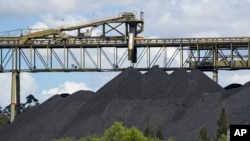Australia's environment minister is facing court action over claims she ignored the impact of fossil fuel projects on the Great Barrier Reef and other natural treasures.
Activists allege Tanya Plibersek has refused to consider the risk of climate change associated with new coal mine applications.
Australia’s Federal Court began hearing the case against Environment Minister Tanya Plibersek in Melbourne this week. The legal action is brought by the Environmental Council of Central Queensland.
The non-profit group insists the federal minister has a legal responsibility to prevent new coal and gas projects from damaging Australia's ecological gems, including the Great Barrier Reef. It is facing many threats, such as warmer ocean temperatures that have led to widespread coral bleaching.
Activists want all mining projects in Australia to be properly assessed for their potential impact on climate change. Their legal challenge relates specifically to applications by resources companies to expand two mining operations in the eastern state of New South Wales.
Christine Carlisle, president of the Environmental Council of Central Queensland, told the Australian Broadcasting Corp. that the risks associated with resources projects need to be fully scrutinized.
“The effects of the emissions from these mines will have a long-lasting impact on the fate and the future of all our living wonders," she said. "We are arguing that the minister needs to be considering those climate impacts when she makes these decisions and to not do so we are arguing is irrational and illogical, and we are asking the court to consider whether it is also unlawful.”
The court case follows a decision by the United Nations last week not to place the Great Barrier Reef in a list of world heritage sites "in danger," which the Canberra government has credited to Australia’s environmental policies.
Plibersek said in a video posted online after the U.N. decision that her government has ambitious environmental policies and recently refused to approve a new coal mine to protect the Barrier Reef.
“Our Australian government has been working really closely with the Queensland government," she said. "We are investing more money - more than $1.2 billion (Australian). We are working to improve water quality. I canceled a coal mine because it could have affected the reef and we have really substantially invested in science to better protect the reef as well.”
Analysts say the federal court case highlights the mounting pressure on Australia’s center-left government, which promised more ambitious action on global warming during last year’s election campaign.
From space, there’s only one living thing that can be seen. It’s the Great Barrier Reef - arguably Australia’s greatest natural wonder. It is made up of 3,000 individual coral reefs off the northeast coast. It’s home to a spectacular array of jellyfish, worms, fish, whales and dolphins.
The Great Barrier Reef was included on the U.N.’s World Heritage List in 1981.
The world's largest coral system covers an area about the size of Japan.




